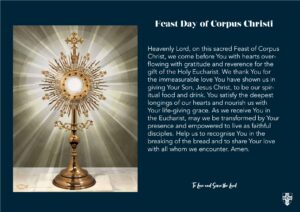Today, we joyfully celebrate the Feast of Corpus Christi, also known as the Solemnity of the Most Holy Body and Blood of Christ. This significant feast day honours the real presence of Jesus Christ in the Eucharist, a central tenet of our Catholic faith. It is a day to reflect on the profound mystery of the Eucharist and its vital role in our spiritual lives.
The Feast of Corpus Christi was established in the 13th century, inspired by the visions of St Juliana of Liège. She experienced a deep devotion to the Blessed Sacrament and longed for a feast dedicated to the Eucharist. her visions and advocacy led Pope Urban IV to institute the feast in 1264 with the papal bull Transiturus de hoc mundo. This feast allows the faithful to give public adoration and reverence to the Eucharist.
At the heart of Corpus Christi is the belief in the real presence of Christ in the Eucharist. During the Mass, through the consecration of the bread and wine, they become the Body and Blood of Christ. This transformation, known as transubstantiation, is a mystery of faith that calls us to a deeper relationship with Jesus.
In John 6:51, Jesus declares, “I am the living bread that came down from heaven. Whoever eats this bread will live forever. This bread is my flesh, which I will give for the life of the world.” These words remind us that the Eucharist is not just a symbol but a real and substantial presence of Christ among us.
The Second Vatican Council teaches that the Eucharist is “the source and summit of the Christian life” (Lumen Gentium, 11). It is through the Eucharist that we are nourished spiritually, united with Christ, and strengthened to live out our faith in the world. Each time we receive the Eucharist, we are reminded of Christ’s sacrificial love and are called to embody that love in our daily lives.
Corpus Christi is marked by several beautiful traditions that highlight the significance of the Eucharist:
- Mass and Adoration: Attending Mass and participating in Eucharistic adoration are central to celebrating this feast. Spending time in the presence of the Blessed Sacrament allows us to deepen our relationship with Jesus and reflect on His love and sacrifice.
- Processions: Many parishes hold Eucharistic processions, where the Blessed Sacrament is carried through the streets, accompanied by hymns and prayers. This public display of faith is a powerful witness to the world of Christ’s presence among us.
- Reflection and Prayer: Take time to meditate on the mystery of the Eucharist. Reflect on how Christ’s presence in the Eucharist impacts your life and strengthens your faith. Prayers such as the Anima Christi and the Prayer of St Thomas Aquinas for Before and After Communion can enrich this reflection.
Celebrating Corpus Christi goes beyond the feast day itself; it is an invitation to live a Eucharistic life. This means allowing the grace we receive in the Eucharist to transform us, so we can be Christ’s hands and feet in the world. As St Teresa of Calcutta said, “We cannot separate our lives from the Eucharist, to moment we do, something breaks.”
By living a Eucharistic life, we strive to embody the love, mercy and service of Christ in our interactions with others. We are called to be a source of nourishment and hope to those around us, especially the marginalised and the suffering.
As we celebrate the Feast of Corpus Christi, let us renew our devotion to the Eucharist, recognising it as the true presence of Christ and the heart of our faith. May this feast deepen our love for the Blessed Sacrament and inspire us to live lives that reflect the transformative power of Christ’s Body and Blood.
“O Sacrament most holy, O Sacrament divine, all praise and all thanksgiving be every moment Thine.”


